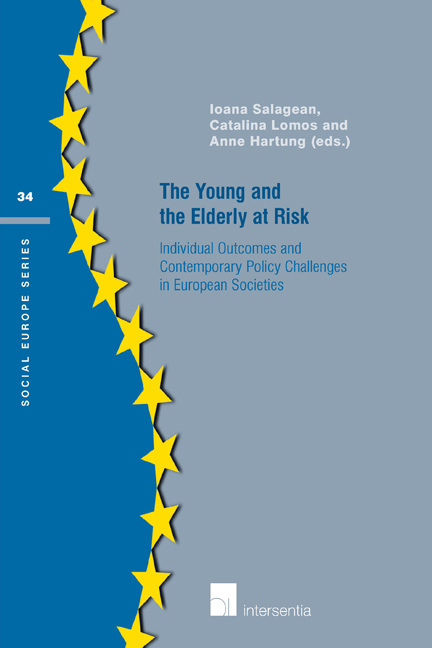 The Young and the Elderly at Risk
The Young and the Elderly at Risk Book contents
- Frontmatter
- Abstract
- Dedication
- Acknowledgements
- Preface
- Contents
- Introduction
- Chapter 1 Does Ethnic Capital Contribute to the Educational Outcomes of Individuals with Turkish Background in Europe?
- Chapter 2 Young Adults at Risk in Germany: the Impact of Vocational Training on the Ethnic Gap At Labour Market Entry
- Chapter 3 Poverty Among Elderly Immigrants in Belgium
- Chapter 4 Integrating Life Course and Pension Policy Perspectives: The Case of Poverty Among Elderly Women
- Chapter 5 Including Assets in Comparative Old-Age Poverty Research: How Does it Change the Picture?
- Chapter 6 The Social and Budgetary Impacts of the Recent Social Security Reform in Belgium
- Chapter 7 Cross-Border Social Security Coordination, Mobility of Labour and Pension Outcomes
- Chapter 8 Do Self-Interest, Ideology and National Context Influence Opinions on Government Support for Childcare for Working Parents?: A Multilevel Analysis
- Chapter 9 Individual Attitudes Towards Welfare States Responsibility for the Elderly
- Rejoinder: Is Intergenerational Solidarity Under Pressure? Comparative Analyses of Age Cleavages in Opinions About Government Support for the Young and the Old
- Biographical Notes
Chapter 4 - Integrating Life Course and Pension Policy Perspectives: The Case of Poverty Among Elderly Women
Published online by Cambridge University Press: 13 December 2017
- Frontmatter
- Abstract
- Dedication
- Acknowledgements
- Preface
- Contents
- Introduction
- Chapter 1 Does Ethnic Capital Contribute to the Educational Outcomes of Individuals with Turkish Background in Europe?
- Chapter 2 Young Adults at Risk in Germany: the Impact of Vocational Training on the Ethnic Gap At Labour Market Entry
- Chapter 3 Poverty Among Elderly Immigrants in Belgium
- Chapter 4 Integrating Life Course and Pension Policy Perspectives: The Case of Poverty Among Elderly Women
- Chapter 5 Including Assets in Comparative Old-Age Poverty Research: How Does it Change the Picture?
- Chapter 6 The Social and Budgetary Impacts of the Recent Social Security Reform in Belgium
- Chapter 7 Cross-Border Social Security Coordination, Mobility of Labour and Pension Outcomes
- Chapter 8 Do Self-Interest, Ideology and National Context Influence Opinions on Government Support for Childcare for Working Parents?: A Multilevel Analysis
- Chapter 9 Individual Attitudes Towards Welfare States Responsibility for the Elderly
- Rejoinder: Is Intergenerational Solidarity Under Pressure? Comparative Analyses of Age Cleavages in Opinions About Government Support for the Young and the Old
- Biographical Notes
Summary
ABSTRACT
While elderly women are found to be vulnerable to poverty in many countries, we still lack in depthinsight as to why this may be. While previous studies rightfully stress the importance of work history, family history and pension regulations in this regard, we demonstrate how an explicit focus on their interaction can improve our understanding of the mechanisms producing poverty among elderly women. To this end, we use Belgian register data covering the lifespan of roughly 9.000 women aged 65 to 71 in 2008. We find that pension policies largely determine how lifecourse events affect old-age poverty risk – whether directly, or indirectly – through their influence on labour market participation. However, an explanation of poverty risk among certain groups of women, such as among married women, purely in terms of pension policy is incomplete. Our analyses suggest that, for those women, asset ownership may also be key for poverty prevention.
Keywords: pension policy, lifecourse, female employment, poverty, elderly Women
INTRODUCTION
Poverty among elderly women is a pressing issue, but by no means a new one. The abundant literature explaining this phenomenon, can largely be divided in two strands: social policy, which mainly focuses on pension regulations in circumventing old-age poverty (e.g. Zaidi et al., 2006; Smeeding and Williamson, 2001), and family sociology, which examines family transitions, career trajectories and their interactions relative to old-age poverty (e.g. Brown and Lin, 2012; Wilmoth and Koso, 2002). While both fi elds have successfully illustrated their merits, there has been little convergence between the two.
In this chapter, we illustrate the necessity of investigating how family histories, career histories and social policy interact. Research studying elderly women's income packages in industrialised countries has shown that their largest source of income consists of pension benefits (Choi, 2006). Arguably therefore, the level of pension benefits largely determines poverty risk among elderly women. Consequently, detrimental lifecourse events can be mitigated by the pension regulations in place. This contribution examines how integrating both a lifecourse and a pension policy perspective improves our understanding of poverty among elderly women in Belgium.
- Type
- Chapter
- Information
- The Young and the Elderly at RiskIndividual outcomes and contemporary policy challenges in European societies, pp. 85 - 106Publisher: IntersentiaPrint publication year: 2015


